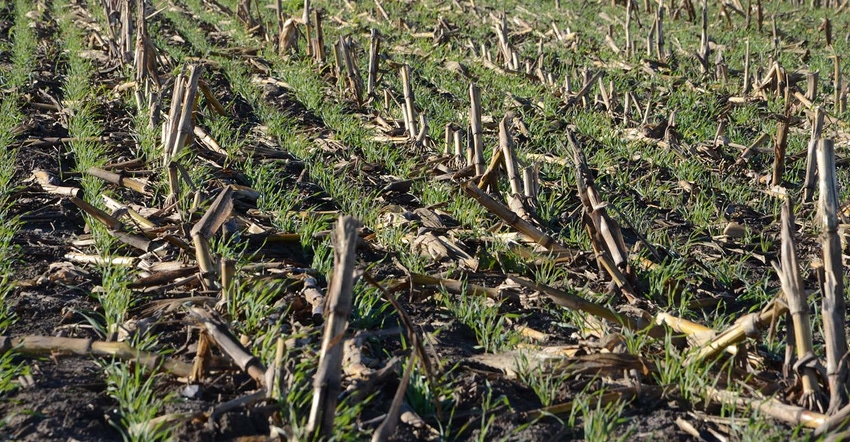January 29, 2020

General Mills has launched a regenerative agriculture pilot with farmers in Kansas’ Cheney Reservoir watershed, which provides water to more than 400,000 Wichita residents. The company targeted this watershed in conjunction with the Kansas Department of Health and Environment to improve water quality as part of the statewide Watershed Restoration and Protection Strategy. The three-year pilot is comprised of 24 wheat growers in and around the 650,000-acre watershed where more than 99% of the land is used for agricultural purposes.
“This pilot is an important step in our commitment to advance regenerative practices on 1 million acres of farmland by 2030, but more so supports our belief that these practices can have long-term positive impact on farmer profitability, soil health, water quality and biodiversity,” said Mary Jane Melendez, chief sustainability and social impact officer at General Mills.
What is regenerative agriculture?
Regenerative agriculture is a holistic method of farming, deploying practices designed to protect and intentionally enhance natural resources and farming communities. These practices focus on pulling carbon from the air and storing it in the soil in addition to helping the land be more resilient to extreme weather events. Additionally, regenerative agriculture practices help to increase water infiltration and reduce soil erosion which have been shown to positively impact the quality of nearby lakes, rivers and streams.
Is this General Mills first foray into regenerative ag?
This announcement builds upon the company’s commitment to improve soil health and to reduce its absolute GHG emissions by 28% across its full value chain by 2025. General Mills is supporting the adoption of regenerative agriculture practices and is partnering with key suppliers like Paterson Grain and Archer Daniels Midland. In March 2019, the company launched a Regenerative Oat Pilot consisting of 45 farmers across North Dakota, Saskatchewan and Manitoba representing more than 50,000 acres of farmland and will measure the environmental and economic outcomes over the duration of the 3-year program.
What's the program goal?
“The goal of the pilot program is to encourage farming practices that improve both soil health and water quality in the Cheney Reservoir region such that agriculture is the solution to a more resilient and clean water supply for Wichita residents,” said Leo Henning, Deputy Secretary of the Division of Environment at the Kansas Department of Health and Environment. “We believe regenerative agriculture can improve the quality of this vital water source and if we are successful, it’s win-win-win, for farmers, communities and the environment.”
How were the 24 growers selected for the three-year pilot?
The 24 growers were selected from a group of more than 150 participants who attended one of two, two-day Soil Health Academies in early November. The Understanding Ag consultants are meeting individually with each pilot participant to co-develop and implement regenerative management plans. By convening and connecting a network of farmers throughout the region, all of whom are evolving farm practices to align with a regenerative mindset, the hope is to rapidly accelerate regionally specific learnings that can be shared broadly. Participating farmers will have access to continuing education via the Soil Health Academy, farmer-focused field days and a private Facebook group to encourage ongoing exchange of ideas and best practices.
"The project represents an enormous opportunity to demonstrate the many on- and off-farm benefits of regenerative agriculture in wheat production, including increased farm profitability, improved resiliency and enhanced biodiversity," said Gabe Brown, Understanding Ag co-founder and farmer. "Thanks to this partnership, UA's regenerative-farmer consultants will work to ensure the successful and profitable adoption of critical soil health-improving practices on these farms."
To provide another pathway for experimentation, an additional 18 growers in Kansas will receive support to enroll in the Soil Health Partnership Associate Program to study outcomes of reduced or no tillage, and cover cropping.
Who will measure the outcomes?
Ecosystem Services Market Consortium will quantify the impacts and verify them independently, then generate certified credits based on actual impacts to ecosystem services attained. The certified impacts allow the benefits to be assigned to another organization's sustainability obligations. General Mills will utilize greenhouse gas improvements in their sustainability reporting, while the Kansas Department of Health and Environment will identify buyers who seek certified water quality benefits that participating farmers achieve.
"This project will result in real, quantified reductions of GHG emissions and nutrient loading to surface water, while also providing key insights to attain efficiency and scale," said Debbie Reed, ESMC Executive Director. "Thorough understanding of how cropland can provide ecosystem services is essential as we strive to offer our programming from coast to coast and ultimately reward producers for services provided across 250 million acres."
The ESMC is building a national-scale ecosystem services market for the agricultural sector.
Source: General Mills, ESMC, which is solely responsible for the information provided and is wholly owned by the source. Informa Business Media and all its subsidiaries are not responsible for any of the content contained in this information asset.
Read more about:
Regenerative FarmingYou May Also Like




